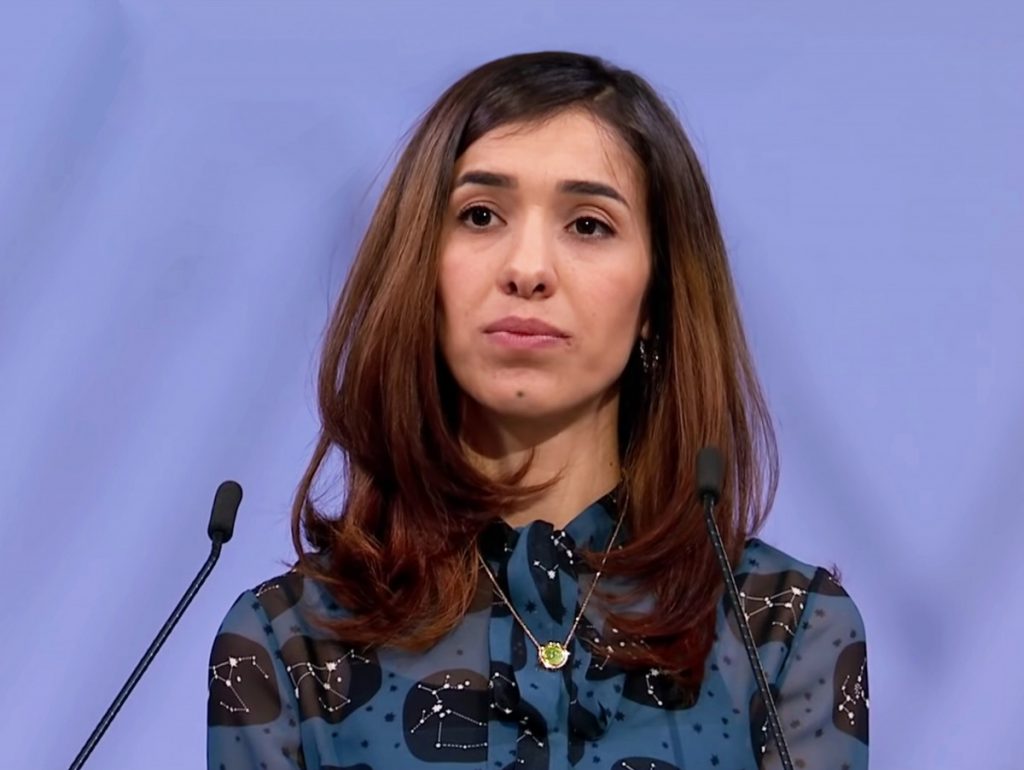As a young Yazidi girl, Nadia Murad lived a peaceful life in the village of Kocho in Sinjar, Northern Iraq. She had dreams of finishing high school and opening a beauty parlor in her village. But in 2014, when Murad was 21 years old, horror struck her Yazidi community, as ISIS launched attacks in an attempt to ethnically cleanse Iraq of all Yazidis. Murad’s mother and six of her brothers were killed, while she was forced into sex slavery.
After her escape, Murad became the founder and president of the non-profit Nadia’s Initiative, a Goodwill Ambassador for the United Nations Office on Drugs and Crime, and a human rights activist. A leading advocate for survivors of genocide and sexual violence, she was honored with the Nobel Peace Prize in 2018 for her work.
At 10:45 a.m. Friday, July 15, in the Amphitheater, Murad will close Week Three’s theme “The Future of Human Rights” by discussing the need for greater awareness of wartime sexual violence and the needs of its victims.
She will be joined by her husband, the executive director and co-founder of Nadia’s Initiative, Abid Shamdeen, who will act as her translator.

Also born and raised in Sinjar, Iraq, Shamdeen advocates for victims of the Yazidi Genocide by managing various projects that have brought aid and assistance to internally displaced Yazidis. He also worked for the United States Army in Iraq as a cultural adviser and translator.
Murad will speak for 10 minutes, before a moderated conversation, wherein President Michael E. Hill will interview her and Shamdeen.
Yazidism, with its roots dating back 4,000 years, is one of the oldest religions in the world. Before the ISIS invasion, there were 500,000 Yazidis in Iraq alone, according to the United States Institute of Peace. Now, the total number of survivors of the genocide by the Islamic State is uncertain, with thousands of Yazidis still internally displaced in Northern Iraq. It is estimated by the Together for Girls partnership that approximately 5,000 Yazidis have been massacred, 6,700 abducted and 90% of the Yazidi population in Iraq displaced to refugee camps.
Murad explained the long history of violence and harm against Yazidis in her Nobel Peace Prize speech.
“In our history, we have been subjected to many campaigns of genocide because of our beliefs and religion. As a result of these genocides, there are only a few Yazidis left in Turkey,” Murad said. “In Syria, there were about 80,000 Yazidis. Today, there are only 5,000. In Iraq, the Yazidis face the same fate, their number is decreasing significantly. The goal of ISIS to eradicate this religion will be achieved unless the Yazidis are provided the appropriate protection.”
Beyond the violence perpetrated against Yazidis, Nadia’s Initiative focuses on the need for justice for survivors of sexual violence. She said during her Nobel Peace Prize speech that more than 6,500 Yazidi women and children were sold, bought, and sexually and psychologically abused during the genocide.
“Despite our daily appeals since 2014, the fate of more than 3,000 children and women in the grip of ISIS is still unknown,” Murad said in 2018. “… It is inconceivable that the conscience of the leaders of 195 countries around the world are not mobilized to liberate these girls. What if they were a commercial deal, an oil field or a shipment of weapons? Most certainly, no efforts would be spared to liberate them.”
Nadia’s Initiative partners with local and international organizations to promote the restoration of Sinjar, Iraq. Their mission, according to their website, is “to create a world where women are able to live peacefully and communities that have experienced trauma and suffering are supported and redeveloped.” They work toward this mission through the collaboration of global leaders, governments and international organizations.
Bringing Murad to Chautauqua to close the week’s theme with a “deeply difficult discussion” of human rights was “critical,” according to Matt Ewalt, vice president and Emily and Richard Smucker Chair for Education.
“Part of what was critical, is to hear directly from someone who has been recognized as a fierce advocate for human rights and has dedicated her life, following awful violence, to be an advocate on behalf of women around the world,” Ewalt said.
Through her work with Nadia’s Initiative and as the UNODC Goodwill Ambassador, Murad calls global attention to the justice and rehabilitation of survivors of human trafficking. She advocates for a survivor-centric approach to the issue.
“I cannot emphasize enough how important it is for survivors to have a seat at the table,” Murad told UNODC in an interview. “From my own experience, I am able to provide a survivor perspective. It is an immense responsibility and not one that I take lightly.”
Ewalt hopes this presentation, that perhaps may be challenging, will lead Chautauquans to reflect on the kind of role they can play in the fight for justice and human rights.
“(Murad) is someone who I think can help to represent many others, not only as a survivor, but (also through her ability) to move into that kind of deep advocacy role and mobilize others,” Ewalt said. “To be able to hear that strong and powerful voice I think is a challenge for all of us.”




